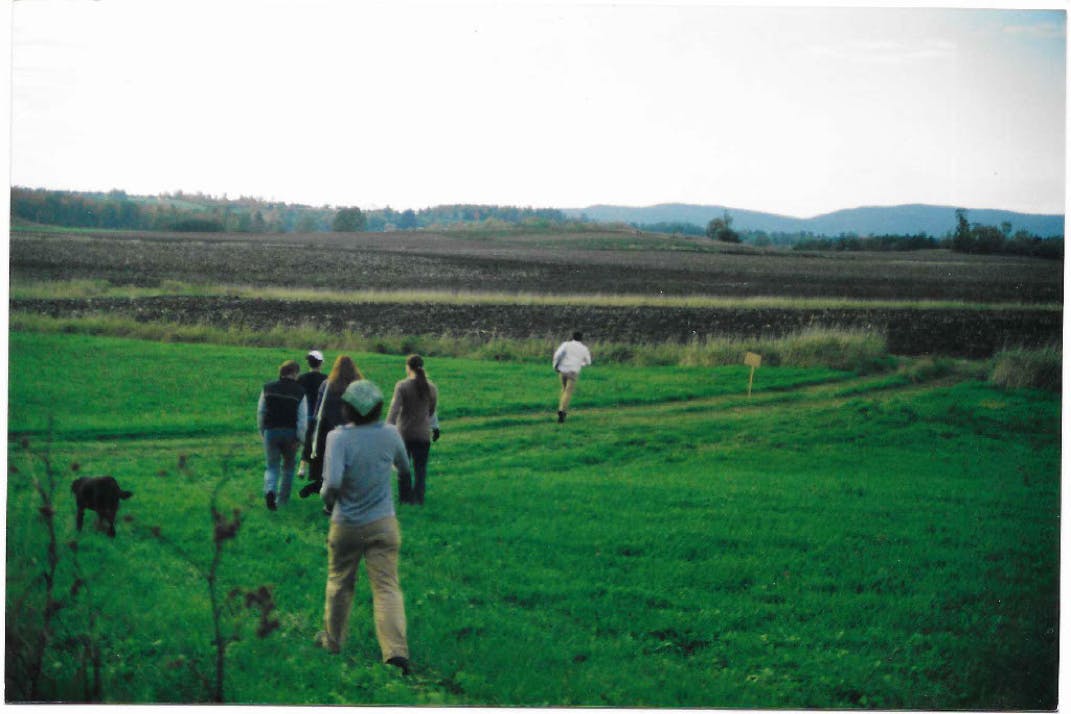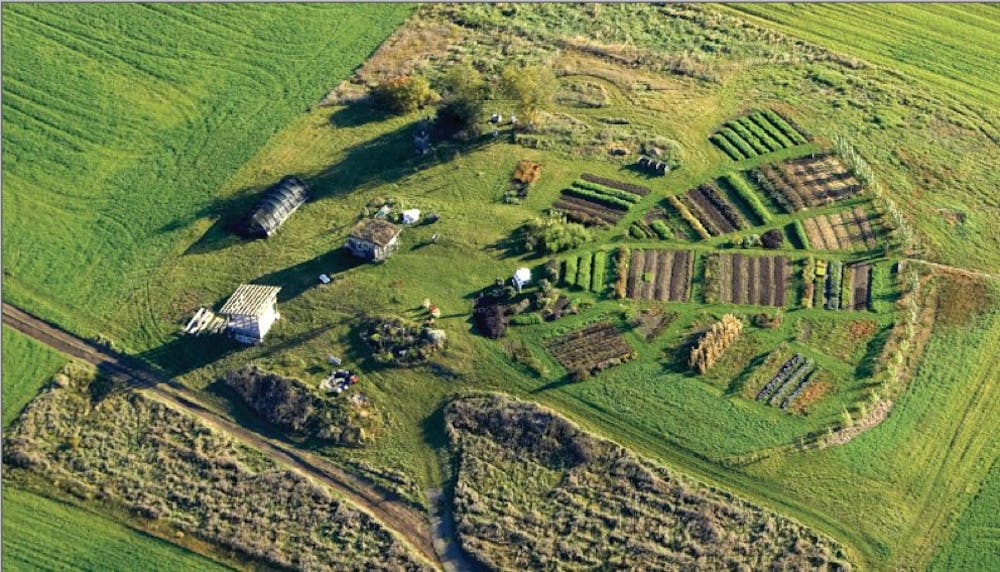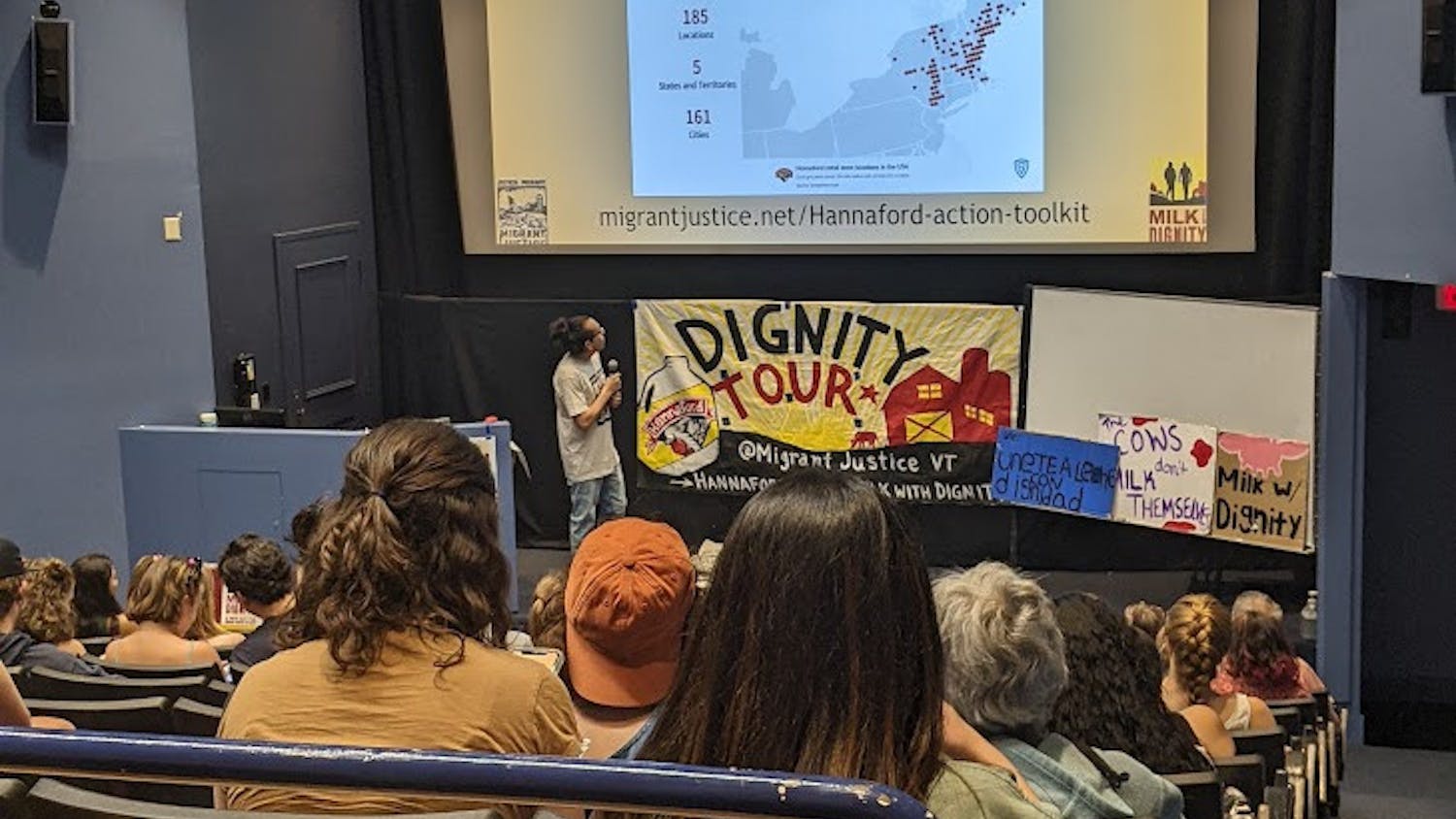Middlebury College’s student-founded garden, the Knoll, was first plowed on an October day in 2002 after months of planning. The garden officially began growing produce in the spring of 2003. As we mark the celebration of its twentieth anniversary, I wonder what the Knoll’s twenty years can teach us about learning and academia, food justice, climate resiliency, community building and radical care. What can it teach us about soil health, flowers and herbs, pollinators and fireflies, and all the love that goes into growing just one ripe tomato? How can we trace the many ways it has enabled students to take root in Addison County, meet local growers and learn the makeup of local food systems?
As one of the last few departing seniors who experienced Middlebury pre-pandemic, it’s been both saddening and joyful to watch this campus evolve, to acknowledge the way that things change and to hope for abundant, nourishing growth to spring upwards from the beds that have been planted. The Campus Editorial Board wisely wrote on the opportunity presented by a post-pandemic campus for the intentional crafting of community and traditions. As we mark the celebration of the Knoll’s twentieth anniversary, I trust that gathering the community to honor the garden’s evolution can provide space for memory keeping and sharing, a gift for a campus still reeling from the after-effects of the pandemic and the fragmentation of knowledge, community and traditions.
The Knoll began in the spring of 2002 when a group of dedicated students led by Jean Hamilton ’04.5 and Bennett Konesni ’04.5 wanted to create a community garden on campus. The location was selected by students through GIS spatial analysis, and the administration was generous enough to offer the plot. Since then, it has become a vital part of student life, providing a space for folks to embody and act on questions of climate justice, resiliency, education and food access. At the Knoll, students are able to root in place and learn to care for a garden, for one another and for this Vermont community that encompasses both the people and the land.
In its first sprouting seasons, the Knoll was held together by a labor of love from students and Jay Leshinsky, the first Garden Educator. In 2003, students cleared the land, planted rows and built the garden shed. Since, it has grown to involve over 300 volunteers annually and grew 140 different varieties of perennials and crops in 2022. Hundreds of student interns and volunteers have kept it growing through the seasons, learning from each other, the land and Leshinsky, as well as previous Food and Garden Educator Sophia Esser Calvi ’03.5. The Knoll has housed honeybees and chickens, grown countless pounds of produce, flowers, and herbs, nurtured lab experiments and projects, and been a space for both gathering and refuge.
Under the guidance of current Associate Director of the Knoll Megan Brakeley ’06, the garden has evolved to be a classroom where students can engage with questions of food justice, seek to repair relationships with the land and learn to center anti-oppression work in our food systems. According to its mission statement, the Knoll “explores food as a medium to cultivate well-being in people, places, and the planet,” which is apparent in its many partnerships. The Knoll has partnered with the non-profit Helping Overcome Poverty’s Effects (HOPE) for many seasons, growing 3,000 lbs of produce for them to distribute in 2021. It also hosts third-graders from Cornwall Elementary School weekly for five weeks every fall so they can learn about soil ecology and gardening. In 2020, the Knoll formed a partnership with the Middlebury Language School of Abenaki, which visits each summer for an Abenaki language revitalization program. In 2020 and 2021, the Knoll grew about 300 pounds of produce for the Nulhegan Food Security Project, an Abenaki organization furthering food accessibility and justice for its members. The Knoll evidently is an access point for students to engage with Vermont organizations committed to food justice and community resilience.
It’s staggering to trace just how much the Knoll has grown over its twenty years. What can its story offer each of us, whether we are an intern, volunteer or occasional visitor? I think at the very least, it shows that with love and collaboration, we each can build something that lasts.
In honor of these 20 wonderful years of growth, we’re excited to formally announce our plans to celebrate this anniversary. In partnership with New Perennials, the Knoll is publishing a community-sourced book of memories, photos, art and poetry submitted by alumni, students, faculty, staff and Middlebury community members. It will be printed this summer and is a tangible record of time spent, vegetables grown and eaten, friendships made, structures built and the joy of learning.
In addition to the book, we hope to have three official celebrations so that as many people as possible can celebrate with us and honor the time and intention it takes for a garden to grow each year through the seasons. On Monday May 15, the last day of classes, there will be a Tea Party at the Knoll, featuring delicious snacks made by Dolci and a tea made with herbs harvested from the Knoll and blended in collaboration with Stone Leaf Teahouse. All are welcome to come to the Knoll to partake in this celebration. Other events are also being planned for the summer over reunion weekend and during our Harvest Festival in October.
As a student, it’s rather overwhelming to think about what twenty years means. I’m barely a few seasons older than the Knoll. So much has happened, but in some ways, it feels as though the garden is just coming into bloom. The Knoll was built by students and is for students, and those in the garden today build off of the labor and love of those who came before. It’s up to each of us, I think, to remember. To mark the passage of time, to learn from those who have come before, to honor the landscape for all it gives us and to choose what comes next. How can we collectively honor the roots that have grown these twenty years while still looking toward all the flowers that have yet to blossom?

Aria Bowden is a member of the Class of 2023.




